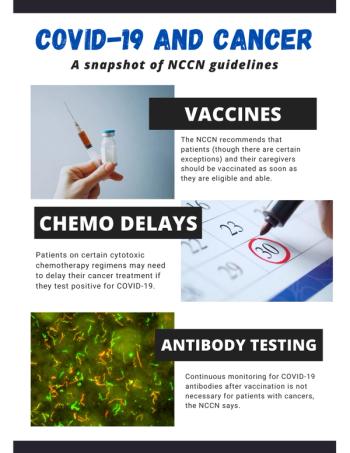
The FDA has approved isatuximab in combination with carfilzomib and dexamethasone for the treatment of adult patients with relapsed or refractory multiple myeloma who have previously received 1 to 3 lines of therapy.

The FDA has approved isatuximab in combination with carfilzomib and dexamethasone for the treatment of adult patients with relapsed or refractory multiple myeloma who have previously received 1 to 3 lines of therapy.

The FDA has granted a fast track designation for annamycin as a treatment for patients with soft tissue sarcoma lung metastases.

The FDA has approved a revised label for daunorubicin/cytarabine (Vyxeos) to include the treatment of pediatric patients aged 1 year and older with newly diagnosed, therapy-related acute myeloid leukemia (AML) or AML with myelodysplasia-related changes.

Ahead of the Prescription Drug User Fee Act action date for the application, the regulatory agency’s Oncologic Drugs Advisory Committee voted 10 to 0 that a decision be deferred until further findings from KEYNOTE-522 trial become available.

While there have been advancements in palliative care programs and clinician education, more still needs to be done, one expert says.

The FDA has approved idecabtagene vicleucel as the first BCMA-directed CAR T-cell therapy for patients with relapsed/refractory multiple myeloma after 4 or more prior lines of therapy, including an immunomodulatory agent, a proteasome inhibitor, and an anti-CD38 monoclonal antibody.

The FDA has granted 2 breakthrough device designations to cover new intended uses of the Signatera molecular residual disease (MRD) test.

A recent study found that cultural awareness among nurses is not enough. Clinicians need more training and resources to improve cancer care for patients with limited English proficiency.

We want to hear from you: what is the limiting factor in managing adverse events in patients with cancer?

The FDA has approved pembrolizumab for use in combination with platinum and fluoropyrimidine-based chemotherapy for patients with metastatic or locally advanced esophageal or gastroesophageal carcinoma who are ineligible for surgical resection or definitive chemoradiation.

Sleep is key to optimal health, and bright white light therapy may help adolescent cancer survivors improve their circadian rhythms.

The real-world utilization of axicabtagene ciloleucel demonstrated favorable outcomes and less frequent toxicity events compared with those reported in the pivotal ZUMA-1 trial and other real-world studies.

The FDA has approved TheraSphere™ Yttrium-90 Glass Microsphere for the treatment of patients with hepatocellular carcinoma.

Here are the key points to know about the National Comprehensive Cancer Network’s guidelines on treating cancer during the COVID-19 pandemic.

Although cancer screening rates and ensuing diagnoses dropped significantly during the height of the COVID-19 pandemic, testing rates from June 2020 through September 2020 have nearly returned to pre-pandemic levels.

The FDA has granted priority review to the new drug application for the HIF-2α inhibitor belzutifan for the potential treatment of patients with von Hippel-Lindau–associated renal cell carcinoma that does not require immediate surgery.

As more Americans get vaccinated against COVID-19, new questions arise, such as: how often should cancer survivors who have been vaccinated against the disease be tested for antibodies?

In this episode of “The Vitals,” an oncology nurse practitioner and certified yoga instructor discusses simple mindfulness strategies that can improve resiliency, leading to fewer feelings of clinician burnout.

While some patients are the exception, most should get vaccinated as soon as they are eligible to do so.

Six indications for immune checkpoint inhibitors granted under the FDA’s accelerated approval process that later failed confirmatory clinical trials are being reassessed as the agency continues an industry-wide evaluation of the pathway.

The National Comprehensive Cancer Network (NCCN) recently issued guidance on treating patients who have both a diagnosis of cancer and of COVID-19.

One in 7 Caribbean-born individuals with either breast or ovarian cancer had hereditary disease with an actionable pathogenic variant, which provides the opportunity for the utilization of targeted therapeutics and precise prevention strategies.


In the era of COVID-19, building resiliency and reducing burnout are key goals for many oncology nurses. Mindfulness and yoga can help.

Many nurses are overworked and burnt out, but changes in health policy may be a step toward making things better. One expert explains how.

Olaparib and talazoparib didn't show statistically significant improvements in overall survival compared with chemotherapy in certain patients with metastatic breast cancer. However, the results are unlikely to affect the drugs’ utility in practice, given that both agents continue to show favorable tolerability and disease control.

One year into the COVID-19 pandemic has allowed for some reflection on the different evolutions that the oncology community went through in response to the many challenges posed by the virus

While nurse burnout is common, there are steps that nurses can take to improve their resiliency and live healthier, happier lives.

The FDA has granted priority review to the new drug application for the novel compound pafolacianine sodium injection for use in the identification of ovarian cancer during surgery.

The FDA expanded the indication for lorlatinib to include the front-line treatment of patients with ALK-positive non–small cell lung cancer.